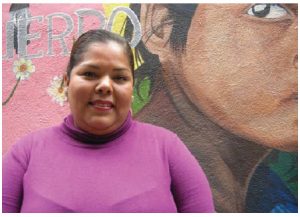
In June 2016, Claudia Medina was one of four women recognized by the Senate of Canada for her work as a human rights defender in Mexico. The following day she spoke at a press conference on Parliament Hill, calling on Prime Minister Justin Trudeau to raise Mexico’s urgent human rights crisis in his talks with Mexican President Enrique Pena Nieto, who was in Ottawa on an official visit. Her voice helped ensure the plight of thousands of women, who are severely affected by Mexico’s grave human rights crisis, would be less easily overlooked on the international stage.
Four years earlier, though, her words would have been stifled under the weight of injustice without the solidarity of human rights activists around the world who spoke out on her behalf. In August 2012, Medina was abducted from her home by officers of the Mexican navy who detained her on trumped-up charges and subjected her to strangling, electric shocks and sexual torture. She endured this illegal detention for 23 days before she was freed on bail after being tortured into signing a “confession” to crimes that she did not commit.
Throughout her ordeal, thousands of Amnesty International supporters in Canada and around the world demanded justice on her behalf, as they do for many others in Mexico, Canada or anywhere else. Upon Medina’s release, she still faced two years of legal battles to clear her name of the unfounded charges levelled against her, but she felt comforted and empowered by the solidarity she experienced. Speaking in Canada before some of the very same activists who stood by her during her darkest hours, she offered words of encouragement and thanks. “I would not be here today,” she said, “without your support.”
Fifty-five years ago, the founder of Amnesty International, Peter Benenson, launched a similar human rights campaign. In 1961, he penned a newspaper editorial calling on members of the public to write letters to governments demanding justice for forgotten and wrongfully detained prisoners who were left to languish in jail cells around the world. People responded in droves and the editorial was reprinted in newspapers around the world. A global movement was born, and at its centre was the unswerving belief that every person’s voice has meaning in the global struggle to promote and protect fundamental human rights.
Today, more than 300,000 people in Canada, and more than seven million worldwide, support Amnesty International’s vision for a global community built around a framework of respect and protection of universal human rights. Together, we speak out and stand up; through the media, online activism, public demonstrations and — like the organization’s founder — good old-fashioned letter writing. Building on our early focus on prisoners of conscience, Amnesty International has lobbied on the world stage for hard-won progress on human rights related to torture, women and girls’ rights, indigenous rights, migrants and refugees, ending the death penalty, corporate accountability, protecting civilians in armed conflict and access to justice.
But much work remains to be done — not least of all in Canada. Over the past decade, Canada’s domestic human rights record and global human rights standing fell into serious and deeply troubling decline. Calls for an urgently needed commission of inquiry on missing and murdered Indigenous women were stonewalled for years. Canada has left crucial international human rights treaties unsigned or unratified. There has been a lack of action to curtail human rights violations by Canadian companies operating abroad. As a result, the weight of Canada’s voice in credibly demanding progress from others on crucial issues was diminished.
Amnesty International Canada is working to help accelerate the encouraging recent progress on what has been a stalled human rights agenda at home. Doing so is of importance not only to Canadians, but also to the entire global community that may benefit from Canada’s reinvigorated engagement toward advancing a human rights-driven agenda internationally. As the case of Claudia Medina makes so clear, everyone’s voice is powerful when used to demand respect for human rights for the betterment of all. It is the mission of Amnesty International Canada to support, empower and stand with them on that journey.
Alex Neve is the secretary-general of Amnesty International Canada.





